South African universities dominate the top ranking of universities on the African continent. And the University of Witwatersrand is quite impressively ranked at number two in Africa. What reason would you give for the dominance of South African universities? And what would you attribute the success of the University of Witwatersrand in particular to?
You can just do this map globally as well. The wealthiest nation in the world, which is the United States, has its top universities dominating the rankings with the likes of Harvard, MIT, Stanford and so on, I mean the list is endless. Followed by and large by China which is rising quite fast as their economy rises faster. The European nations, the global north as you all know, also dominate the rankings. You will find that the rankings favour those nations that are relatively advanced. Australian and Canadian universities, for example, are also doing very well.
South Africa doesn’t have the largest economy, but it’s got the wealthiest economy. In terms of the highest concentration of wealth, Johannesburg is the wealthiest city on the continent, which therefore gives it greater access to resources, technology and so on. All these contribute to its positioning and of course, its networks. South Africa is well connected to the global north, and to Europe and America in particular. So that lends itself because I believe we have people who have come, who have studied and have left to work in New York and London, so of course that would speak highly for our rankings. I think that’s part of what gives South African universities an advantage but I can’t say that rankings are a scientific measure of quality. They’re just one of the indicators as to why South African universities are ranked so highly. And it’s not just South African universities, it’s the South African universities that are relatively privileged if you know South African history – advantaged universities such as the universities of Cape Town, Stellenbosch, Pretoria, Natal and Johannesburg. They were classified as “historically white universities” and located in urban areas whilst the universities of Zululand and Fort Hare and others are located far from the urban areas and from major economic activity as well.
Sir, would you say African university programs are relevant for these modern times? This is a two part question. The second part is, do they adequately prepare graduates to provide solutions to African and indeed global challenges?
Change of university programs regularly is not only important in Africa, but globally. We need to constantly review and update our curricula to meet the changing needs of the world, and the world of work.
Our curricula need to be improved dramatically given where we are with artificial intelligence, ChatGPT which is threatening the way we teach, learn, and assess our students.
So, I think that universities are on a major global catch up with their relevance in society. There’s online learning and so on and so forth and I think that African universities are not unique in that regard. But having said that, we need, as African scholars and administrators, to take account of the fact that some of the curricula that we have, were designed in colonial times. So we need to move with the times, and move with the realities of who we are, but still ensure that we offer quality programmes – that’s very important. We must keep up with international trends in artificial intelligence, quantum computing, and the evolving world of work. We can’t isolate ourselves as we are globally connected and need to be able to solve those global problems from our location in Africa and the Global South. We cannot be an imitation of the Oxfords, the Cambridges or the Harvards. We need to be an imitation of ourselves.
Maybe it’s time for universities in Africa to have a harmonized curriculum. Would you agree?
A harmonised curriculum will be a bit of a challenge because even if you’re in South Africa, as I mentioned in my response to your first question, you will find that the curriculum varies according to context. So what is relevant for the context in Johannesburg might not be the same for the context even in Cape Town or in KwaZulu-Natal or Free State which are all in South Africa, let alone the context that will be relevant for Harare or Benin. So, yes, there has to be a common understanding of the basic standards that we need to have so that maybe there could be a level of interoperability where to a degree we can collaborate and partner, but it can’t be the same curriculum. Maybe the way I can phrase it is, would it help if the university system is interoperable? So with a qualification from one country, you are able to pursue graduate studies in another country? Of course, there will be moments of articulation here and there, but I think that to harmonize will be a very difficult exercise. They are going to talk to each other, but not harmonize.
What do you think of having an African lectures/students exchange programme?
Are there both pros and cons?
There are no cons at all. I think there are only pros because it’s important that we, as part of the agenda 2067, have interoperability. The scholars can only be exchangeable if there is an understanding of what we can call common norms. Not so much regarding variety from school to school, but there have to be common norms and understanding, especially in the areas of STEM, where we don’t have the original contact.
Legal students might change from country to country, social students might change from country to country, but in the areas of science and something I’m more familiar with, Newton’s laws apply in Abuja as much as they apply in Mars, so the engineering standard, of course, must be interoperable so that when you are laying down a gauge railway line you set a common understanding of what the railway gauge size must be no matter the location. If we all have different gauges, then my standard of setting the gauge will not match with yours and trains will not move around the continent. The same goes for pilot training, for example, we need a common protocol to allow the interchange of skills among these areas that allow for easy movement.
I’m using a very simple example to speak about how you can connect the African continent like Europe has done or even the United States – each state still has its own local context but you can move from one state in the US to another because there’s a broad understanding of principles and of what are accepted norms in engineering standards. If we can do that, I think we’ll be able to realise the vision of inter African trade. But I think that it’s a question of training. Do our degrees talk to each other? Am I able to exchange scholars? Are we able to exchange students between countries? And to learn in a different context as well.
We cannot do it with the same curriculum. Because if it’s harmonised, then what’s the point in going to Nigeria if I’m not learning anything new?
So the whole thing about learning is to have those healthy differences that allow for the replenishment of ideas and knowing what someone can do better than others, how they work in that context and how you can adapt it to your context.
SIMILAR ARTICLES: Interview with Professor Ekanem Ikpi, Braide (OFR)
Interview with Mr Chris Uwaje (The Oracle)
Interview with Mr Chris Uwaje (The Oracle) – Part 2
Do you consider STEM a critical infrastructure to transform education in Africa? I think you touched on this a little bit too.
Of course. I think that’s what has happened since the end of the colonial era. If we look at West Africa where you have great universities like the University of Legon and the University of Ibadan that are very strong in the social sciences, like its school of literature, this is fantastic. Now, I’m not saying that it’s not important because it is, but you’ve seen that, for example, because of the resources, the number of graduates that come out of areas such as computer sciences, mathematics, physics and others that are central to driving our industrialization, we find that those numbers are not comparable to law and other social sciences. So I think we need to build on the excellence we have in the humanities but also focus on the STEM areas.
And that universities cannot do alone. STEM subjects are very expensive. You need to build state of the art laboratories to get your best scholars, your best students and your best academics and the best administrators. And all that is quite expensive because most of the equipment is imported from Germany, the United Kingdom and America. Meanwhile, the American currency is much stronger than ours. So then you need to think of books too, and libraries. You import books from the global north and the book prices vary according to the currency which fluctuates. That can be a challenge. You can pool resources together and build national institutions together so we can benefit from the economy of scale. I think that’s very important because without STEM producing more engineers, doctors, biologists, people who can do vaccinology to help us to produce our own drugs, how can we escape this vaccine apartheid that people spoke about during the last few years?
It was said that the global north kept and hoarded the vaccines themselves. And then once they’ve done three or four rounds of vaccinations among themselves they dump the leftovers in other countries. So I think to put an end to all of that, we have to build our own capacity for vaccine production. And that is STEM education, nothing else.
So STEM has to be incorporated into the African agenda like China has done. China has caught up with the West because they recognised the importance of STEM. But don’t remove the humanities because you don’t want to produce robots who cannot think. If you have STEM out of context, that itself can be a problem. For example, if you’re a doctor, you must understand the context, the culture and so on, and that is provided by sociology.
Do you think introducing an industry to university study program would benefit Africa as a strategic imperative for mastering the future of work? Something similar to the celebrated German dual education program?
Yes, I’ve been thinking very hard about that and I’m moving between yes and no. Due to the diversity of the system, if you are at a university that works with or is linked to the financial and industrial sector, that could possibly work. But if someone comes from a small village in Togo, for example, where there is no industry, it might be difficult. Therefore, you have to speak to the context. Is that a Services industry? Is that industry Tourism? Is that industry Agriculture? Many countries are agriculture centered. In the future there must be nationalization which I think is attainable. I think you cannot use one blanket reason. The industry in Nigeria or Ghana could be the Petroleum industry. And that to me is best done not by universities, because universities provide comprehensive education, but can be done by what the Germans call Trade schools or Vocational schools because the purpose of universities is to produce intellectuals. So, if it then becomes vocationalized, the relevance of universities will be reduced to that of just a vocational school, whereas the aim of universities is to produce people who can think, who can be multidimensional in approach – not just to what is in the books, but what is happening in the world. Universities should produce original thinkers and those who can be agile in a particular area. I think that an element of vocational services can be applied in universities, but I think vocational colleges will be best positioned to do this.
Can an AI based African language model positively impact the education of African children?
It can in principle. However, it’s going to be complicated because you’ve got more than 51 countries and within each country – maybe I can exclude the northern countries where they generally speak one language and that language is the Arabic language which is spoken from the Sahel to the Levant and to the Middle East – but in sub-Saharan Africa or in Nigeria for example, there are so many languages. Here in South Africa, if I exclude Afrikaans and English, we’ve got ten other official languages. isiZulu, which is the largest language spoken in South Africa, and I’m going to use South Africa as an example because that’s what I’m more familiar with, there are about 12 million speakers out of a population of about 70 million. If you include some parts of Swaziland and some parts of Zimbabwe, then a maximum of 20 million people who speak it. While in Germany, you can have one language spoken by 90 million people or 100 million people if I include Austria, Belgium and other countries in the neighbouring area that speak German. Same with Italian, 18 million people speak the same language.
So what I’m trying to say here is that it would be very complicated. It’s going to be costly. I mean twelve AI languages for one country! Technically it’s going to be difficult. So, unless we come to an understanding of what is the most commonly spoken language in East Africa, which is Swahili and which is spoken in Tanzania, Uganda, parts of northern Mozambique, Rwanda and then some parts of Congo, at least then you could have enough economy of scale to actually have this kind of model. So you can’t have 200 languages (let’s even say there are only 200 languages in Africa). It’s going to be cumbersome. It’s a nice idea but it’s just going to be complicated. I don’t see any easier way. And I think those resources would be better spent on getting our kids to understand AI in the first place and keep up with this fast-moving game.
How can shared Research and Development collaboration of African university professors and scholars help to protect the continent’s intellectual property and create sustainable wealth for Africa?
That’s a fantastic question, actually, because there’s an African Research University Alliance (ARUA) which does exactly that. Its membership includes six universities in South Africa, three in Nigeria, two in Ghana and others in Ethiopia, Mauritius, Tanzania, Kenya, Rwanda, Uganda and Senegal. They come together to identify areas of common interest so that they can think of tackling much bigger African problems like the treatment of malaria as the challenge of malaria cannot be done by a South African University alone. It could be the University of Cape Town collaborating with the University of Nairobi or the University of Ibadan. So, that way we are using three different angles to approach one big problem. And the same can apply to Ebola as well, where we could have a station somewhere and have a hub somewhere else as is often the case in virology. I think these kinds of collaboration that allow people to apply for joint grants and share resources accordingly can help universities to start acting collaboratively in tackling problems. It all comes back to my original question that you want to build the right economies of scale because no single university, not even Witwatersrand or Cape Town alone, can compete with the likes of Harvard but if we all join our resources then at least the collective has enough firepower to make a much bigger impact. So I fully agree with you in terms of the shared collaboration. Of course we need to continue collaborating with our partners in the global north because we can’t be isolated.
But we must not collaborate on the basis of a neocolonial agenda where you become the people who provide the raw resources but the data gets analyzed in Europe while the publication is done by Harvard.
A situation where Wits, for example, now finds its name amongst one of the last authors given credit and in the end the contribution of one’s researchers and the institution become mere footnotes in the collaboration. But if you build enough economies of scale, you will be able to collaborate with Oxford and say this is the contribution from University A, B, and C, and therefore we deserve our seat at the big table of analyzing data. So they are not just coming here, collecting specimens and analyzing them in the north. Instead, we can now share these resources, analyze the data here and contribute to the end product, which in our work, is the publication and the intellectual property. And by so doing as well, the IP doesn’t just end with a piece of paper. It rests here (pointing to his head). Because, I mean, if people leave their own home countries because there are no resources and go to work in the global north, what have they done essentially? They have taken their IP with them. So the key to maintaining IP is the retention of our talented people.
African children are currently consumed by the influence of social media. How can African universities help to develop digital platforms in our indigenous languages to save them from extinction?
I did touch on this, but I can’t really answer it, I have to admit because all children, whether they are African or Asian or American, are all consumed by social media and these influencers and so on and so forth. And like all young people, they are connected to the world. As you correctly point out, these social media platforms are in English. I saw that even TikTok can be both in English and in Chinese. The thing is that we African countries need to produce our own platforms that speak to our content, and to which our children can relate. For example, gaming. Japanese games are developed in Japan and they talk about someone going to do something on Mount Fuji. The technology is the same but the story that is narrated is more indigenous. Nigeria has done a fantastic job with Nollywood, that by using the same technology, which is basically the visual arts, they have been able to weave through their stories. For example, they are able to bring the content of people living in villages in Nigeria to the world. And then people understand that kind of art of storytelling. I think games are no different from that. All these platforms are not different from that. It’s about you telling your own story. So, by developing your own platform, you are able to partially protect your language. It’s about you being able to narrate your own story which will attract an audience that understands the content, or is curious to understand the content. So it’s about STEM and the arts, it’s about being the producer and the content developers and controllers. To me, that’s the most important thing – us producing our own content. That way we can halt the trend of African stories often getting relegated to the lower leagues.
Many African governments find themselves unable to adequately fund tertiary education. Do you have any suggestions on how African universities and technical/vocational education can be better funded?
Yes, I understand that African governments, including mine, have to contend with many issues, the infrastructure challenges that we all face, the social challenges of poverty, unemployment, social cohesion, stability and basic welfare of the people. So, universities are seen at the policy level only as luxuries, only for the elite, or so they thought until the climate change outbreak. The World Bank model in the old days required basic education that met the requirement of basic human rights. So, if you provide education from four to 16 years old, you’ve done the job. Then the rest will take care of itself. And governments kept focusing on that. Now they’re beginning to realize that actually we are missing out on the knowledge economy and the only driver of the knowledge economy is the tertiary sector with well equipped laboratories and the like. Well, of course there are such things. We do have such infrastructure, but those that do are only a small minority. Now we are trying to expand that offering to the rest of the sector. Many historically disadvantaged universities do rely on government funding. They rely on subsidies from the government. But also (and I know I’m going to be challenged here), we do have enough wealthy people on the continent. We need to develop our own philanthropy. The US system was partially built by their spirit of philanthropy when you look at the Carnegie Foundation, Ford Foundation, the Bill and Melinda Gates Foundation and others, which is US money in the sense that they are registered in the US.
They establish endowments that support universities. Harvard for example is a private university that does not get much money from the state and yet is a top university because it gets support from its alumni and this big endowment that they raise. I think that the challenge for us Africans is to talk to the Africans that actually have made it. Maybe people like Mo Ibrahim and many others, to say, guys, for Africans to be respected, let’s not take this money to invest in Harvard, but invest money back home, not take care of the entire education, but just to allow universities to also have that third stream income. So, even if some universities still enjoy some subsidy, they can also receive income from fees, services, and from endowments. And I think that’s how Wits is beginning to fundraise internationally, just by reaching out to our alumni to raise money. But that’s not enough, the state and industries still have a large part to play in making universities sustainable.
And that brings us to our final question sir. Education must be global, yet culturally relevant. Do you agree?
100%. There’s no point in justifying it. It’s clear.
Thank you very much sir.
Thank you very much.
Those were very stimulating questions. They made me think. I look forward to reading the interview.
________________________
Professor Zeblon Zenzele Vilakazi is the Vice-Chancellor and Principal of the University of the Witwatersrand, Johannesburg, South Africa. He was instrumental in establishing South Africa’s first experimental high-energy physics research group at CERN, working on the Large Hadron Collider. Vilakazi has fostered international collaborative research, as Director of iThemba LABS (the largest cyclotron facility in the southern hemisphere) where he initiated a flagship rare – isotope beam (RIB) project. In 2019 he played a role in securing a place for African academic partners in the development of practical applications through access to the IBM Quantum Computing network. In May 2022, Professor Zeblon Vilakazi was elected as a Fellow of the Royal Society (UK), a self-governing Fellowship made up of the most eminent scientists, engineers and technologists from the UK and the Commonwealth.
SIMILAR ARTICLES: Interview with Professor Ekanem Ikpi, Braide (OFR)


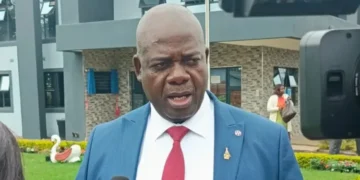
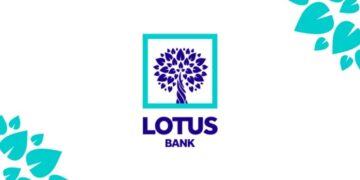

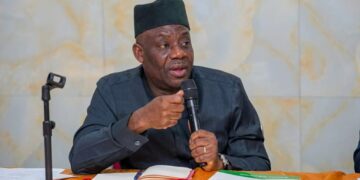

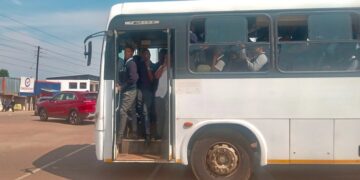






















































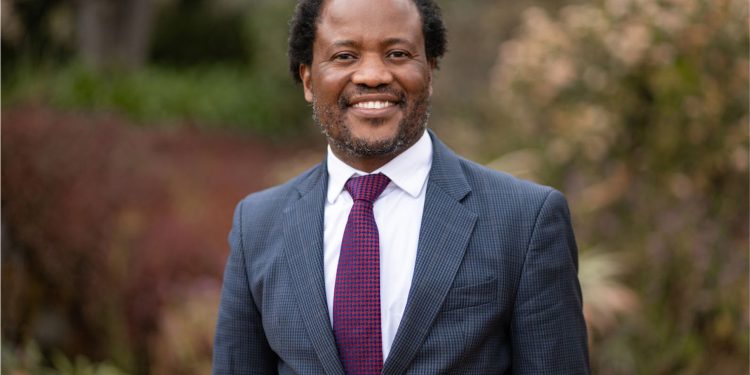




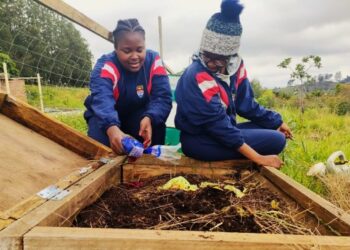


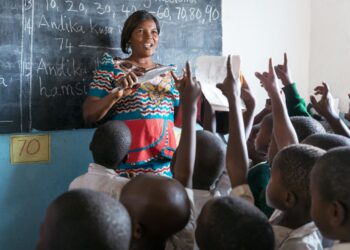

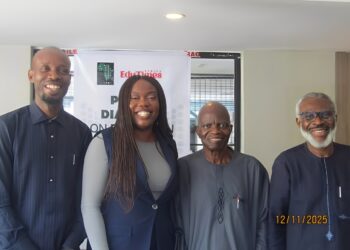










 EduTimes Africa, a product of Education Times Africa, is a magazine publication that aims to lend its support to close the yawning gap in Africa's educational development.
EduTimes Africa, a product of Education Times Africa, is a magazine publication that aims to lend its support to close the yawning gap in Africa's educational development.